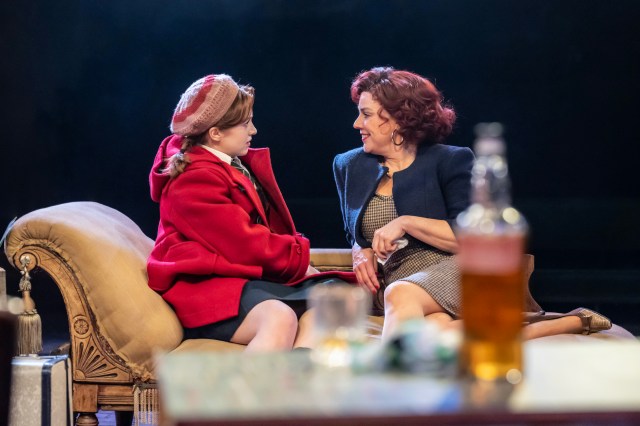A Taste of Honey at the Royal Exchange – review
Shelagh Delaney’s modern classic returns to Manchester

Revivals are often perceived as merely the bringing back of an old play. Emma Baggott’s wonderful production of Shelagh Delaney’s 1950s kitchen sink drama understands that to revive is also to make it pulse, beat and glow so artefact feels alive. That word revival has significance for the play, too: a mother making the same mistakes; a daughter, before long, repeating them.
In its last major outing, a National Theatre tour that opened in Salford where the play is set, Jodie Prenger’s sultry siren dominated. Here, it’s Rowan Robinson as daughter Jo who holds the charge. From the start, lines between mother and daughter are blurred and inverted. Robinson marches in and out of the room – even salutes her boyfriend goodbye – and has lines that age her beyond a schoolgirl: “I’ve heard about men like you”. Jill Halfpenny’s Helen sprawls across furniture like a lethargic teenager. It shows us how Jo has had to mature into an adult due to her mother’s neglect, while parenting them both, often calling her mother by her first name.
A draught blows through the apartment, and seems to carry men in and out on the breeze. Delaney’s writing leaves the male love interests feeling thin and flimsy. But there seems some purpose in them appearing so weak you can’t ever see them lasting. Andrew Sheridan overcompensates with too much obvious lecherousness – constantly groping and spanking – and threats fly so easily out of him that it’s hard for any to stick.
When Helen returns in the second half, her nastiness also feels a little crude and lacks enough suggestion of his brutal dumping that’s impelled her to reclaim her daughter so fiercely. At the same time, the script becomes declarative: Geoffrey points out how Jo is inadvertently mirroring her mother.
She falls into the kind of hasty early marriage that appalls her about her mother. And when she performs recitations for her friend Geoffrey, her hands attach to her hips and she twirls in the centre just as Helen did. As she also waits for her baby’s absent father to return, she devolves into Helen’s bitter, self-destructive sniping at those looking after her. Halfpenny delivers her own as spikily as the heels she struts around in, wearing dresses that convey waning beauty: grime-green and blotched, dust brown, or faded cherry like a sickly rose.
Grit and hope are fused together in Peter Butler’s set. Metal beams resemble cranes that allude to the industrial site – in one argument, they lower and compress the characters as though they can’t escape it. They’re also lined with carnival bulbs like dreams overhead, which Robinson often looks up at. Her face seems a bulb itself, lighting up with hope. David Moorst has a similar helpless quality as Geoffrey, increasingly resembling the teddy bear he brings, head lolloping shyly. He wraps his arms across his own chest, wanting to be held.
Wistfulness and yearning hums through the air. Nishla Smith sings slow, melancholy verses of “Dirty Old Town” that drift across the stage like the smoke. The play has its own jazz rhythm that Baggott perfectly paces – unhurried but never unengaging. It doesn’t all need to be revived, though. It could afford – especially at nearly three hours – to edit out the clumsily introduced racial angle which relies on a catastrophic horror and shame at having a black baby that we no longer recognise.
Baggott also makes the final note explicitly empowering and galvanising with a last musical swing decidedly into sentimentality for a play that should be bittersweet. Its characters, after all, only ever get a taste of a better life.















